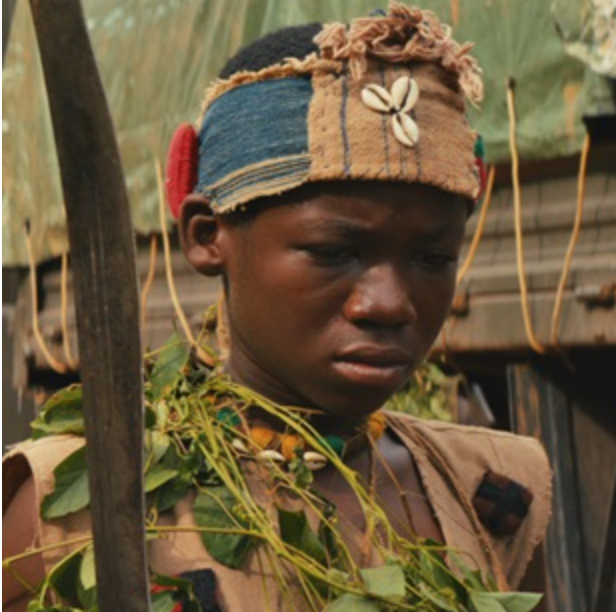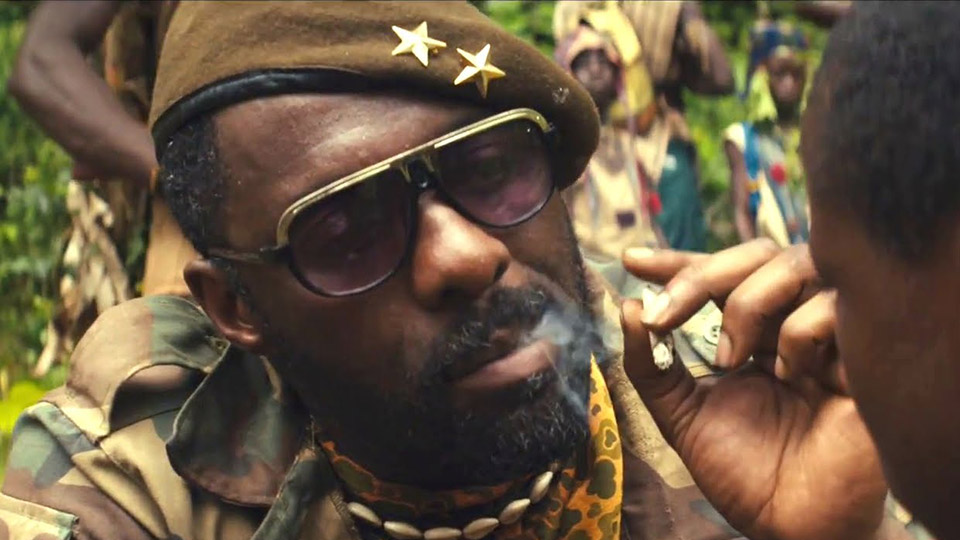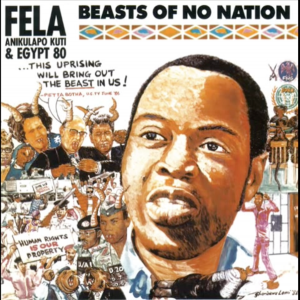 It is entirely possible that “Beasts of No Nation” will not achieve the audience that it deserves. Adapted from Nigerian-American Uzodinma Iweala’s fiercely economical 2005 debut novel, it is an extraordinary allegory about the machinery of human violence. But as it is being distributed on Netflix’s streaming service with a limited theatrical release, it is unclear whether viewers will elect to view a 136-minute, virtually celebrity-free film about rebel forces who have taken over an unnamed African country when they can binge-watch “Orange Is the New Black” on the same screen. In an ideal world, they’d watch both.
It is entirely possible that “Beasts of No Nation” will not achieve the audience that it deserves. Adapted from Nigerian-American Uzodinma Iweala’s fiercely economical 2005 debut novel, it is an extraordinary allegory about the machinery of human violence. But as it is being distributed on Netflix’s streaming service with a limited theatrical release, it is unclear whether viewers will elect to view a 136-minute, virtually celebrity-free film about rebel forces who have taken over an unnamed African country when they can binge-watch “Orange Is the New Black” on the same screen. In an ideal world, they’d watch both.
Certainly “Beasts of No Nation” is Cary Joji Fukunaga’s most assured film to date. A gifted cinematographer, screenwriter, and director, Fukunaga is Hollywood’s latest triple threat – that rare creature who can ground out his own visions holistically. His directorial projects may superficially have little to do with each other but thematically are very much of a piece. Each interrogates the violation of children and of the institution of childhood itself: The macabre gloom of HBO’s first season of “True Detective” hinges on crimes inflicted upon kids; “Jane Eyre” (2011) takes on the bleak existence of a nineteenth-century English orphan; and “Sin Nombre” (2009), which he also wrote, catalogues the difficult passage of young Central Americans to the United States border. “Beasts” may be his tour de force.
Agu (outstanding Ghanaian actor Abraham Attah) is a puckish young boy who lives with his mother, invalid grandfather, schoolteacher father, and younger and older siblings. Though trouble already looms, the rebels have not yet claimed his small village, and Agu and his pals entertain themselves with a steady routine of wisecracks and skits. “This is an imagination TV!” he announces, wielding a rusted monitor, and his gang acts out various skits through its screen-less frame to bemused soldiers. Then, in a quick, savage sequence, Agu is separated from his mother and younger siblings and barely escapes while his father and brother are executed for attempting to protect their home.
 While cowering in the woods, he is seized by an army of kids and teenagers led by the grizzled, bellowing “Commandant” (Idris Elba), who in turn reports to a mostly off-screen Supreme Commander. Agu has no choice but to join their ranks, and soon enough is sporting their uniform of African and American rags, wielding a machete, and submitting to an initiation ritual in which he’s forced to kill a prisoner whom the Commandant pretends killed Agu’s father. No one, least of all Agu, believes this explanation, but in the boy’s new reality he knows he must slay the man anyway. What follows is a brilliantly hewed brutality in which this makeshift family, equipped with more weapons than food, roves the countryside, ambushing enemy caravans and raping, pillaging, and killing soldiers and citizens.
While cowering in the woods, he is seized by an army of kids and teenagers led by the grizzled, bellowing “Commandant” (Idris Elba), who in turn reports to a mostly off-screen Supreme Commander. Agu has no choice but to join their ranks, and soon enough is sporting their uniform of African and American rags, wielding a machete, and submitting to an initiation ritual in which he’s forced to kill a prisoner whom the Commandant pretends killed Agu’s father. No one, least of all Agu, believes this explanation, but in the boy’s new reality he knows he must slay the man anyway. What follows is a brilliantly hewed brutality in which this makeshift family, equipped with more weapons than food, roves the countryside, ambushing enemy caravans and raping, pillaging, and killing soldiers and citizens.
If the Commandant cut a less complex figure, this film would be intolerable. But Elba channels the conflicted menace with which he built out the drug lord Stringer Bell of the HBO series “The Wire,” and we are sucked into his chilling farrago of paternalism and pathology. Drug-addled and depressive, he refers to the boys as his sons, and alternately rewards and terrorizes them, even having sex with a few of the youngest ones, including Agu. We are spared graphic details of these acts, but the implication is perhaps even more chilling, for it draws us deeper into the hyper-vigilance that the boys require for their survival.
 Fukunaga’s filmmaking is lustrous and swift without ever resorting to hand-held jumpiness; we move from the joyous clamor of Agu’s first world to the bloody fraternalism of his second so rapidly that we share his Stockholm Syndrome. The novel is told in Agu’s rhythmic first-person voice, intercutting between these two realities with a stream-of-consciousness urgency that occasionally leaps into a dreadful clarity. This film preserves this intensity by shuttling forward with an increasingly grim linearity – a tidal storm, really. “I am not bad boy. I am soldier and soldier is not bad if he is killing,” Agu says early in his tenure in the Commandant’s army. By the end, he has achieved a quiet, dry-eyed self-awareness that is more terrible – and more awesome – than anything that precedes it.
Fukunaga’s filmmaking is lustrous and swift without ever resorting to hand-held jumpiness; we move from the joyous clamor of Agu’s first world to the bloody fraternalism of his second so rapidly that we share his Stockholm Syndrome. The novel is told in Agu’s rhythmic first-person voice, intercutting between these two realities with a stream-of-consciousness urgency that occasionally leaps into a dreadful clarity. This film preserves this intensity by shuttling forward with an increasingly grim linearity – a tidal storm, really. “I am not bad boy. I am soldier and soldier is not bad if he is killing,” Agu says early in his tenure in the Commandant’s army. By the end, he has achieved a quiet, dry-eyed self-awareness that is more terrible – and more awesome – than anything that precedes it.
This was originally published in Word and Film.
